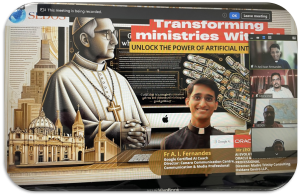
Dear Members and Readers,
In the hustle and bustle of modern life, finding moments of quiet and reflection can be challenging. For religious and missionaries, whose lives are mostly dedicated to serving others, the need for nourishment is even more crucial. Lectio Divina or “divine reading” is an ancient spiritual practice rooted in Christian monastic traditions. This contemplative method of engaging with Scripture has been a cornerstone of monastic life for centuries and continues to be a vital practice for deepening faith and mission today too.
It offers a profound method for religious individuals and missionaries to engage with Scripture deeply. This practice which involves slow, contemplative reading, meditation, prayer, and contemplation, provides a means for nurturing a personal relationship with God and fostering spiritual growth. For religious and missionaries, whose lives are dedicated to spiritual formation and spreading the Gospel, Lectio Divina serves as a vital tool to deepen faith, to discern God’s will, and find sustenance for their mission. It offers a means of spiritual nourishment and renewal through the Word of God. While reconnecting with God it reminds them that their work is not just a human endeavour but a participation in God’s mission. For a religious and missionary, it fosters a deep personal relationship with God by creating a space for intimate dialogue through Scripture. This practice encourages them to listen attentively to God’s voice, reflect on His words, and respond in prayer.
Lectio Divina also helps people to discern the will of God in situations where they need to find direction for their ministry. Through Lectio Divina, individuals can gain insights into how God is leading them in their mission. It helps them realize that their work is not merely driven by human plans but is deeply rooted in divine guidance.
Besides individual spiritual growth; Lectio Divina also equips religious and missionaries to integrate Scripture into their daily lives and ministries. It ensures that the Word of God becomes living and active in their lives, influencing every aspect of their vocation. It helps missionaries, who preach and teach the Gospel, to internalize the message they are sharing with others. It allows them to speak not just from intellectual knowledge but from a deep, lived experience of God’s Word. It also fosters a continual reflection on Scripture, which can enrich their communal prayer life, spiritual direction, and pastoral care.
Lectio Divina traditionally has four stages; lectio (reading), meditatio (meditation), oratio (prayer), and contemplatio (contemplation) which provide a structured approach, but it can also be adapted to meet the specific needs of religious and missionaries.
1. Lectio (Reading), the first stage of Lectio Divina involves a slow, deliberate reading of Scripture. The practice of choosing the passages that resonate with their current mission or challenges, can become more relevant and impactful. For example, a missionary working in a context of poverty may choose passages that focus on God’s preferential option for the poor, such as the Beatitudes (Matthew 5:3-12) or the parable of the Good Samaritan (Luke 10:25-37). A missionary or religious involved in education might reflect on Jesus’ teaching methods in the Gospels. Selecting these texts with their mission in mind, they can find specific guidance and encouragement for their work.
- Meditatio (Meditation): The meditation stage invites individuals to reflect deeply on the meaning of the text and its application to their life and mission. By meditating on the text related to their specific context, religious and missionaries can gain new perspectives on their work and be open to the transformative power of God’s Word.
- Oratio (Prayer): In the prayer stage, individuals respond to God’s Word with their own prayers in the form of thanksgiving, supplication, confession, or intercession. It is also an opportunity to bring their mission before God, asking for strength, guidance, and for grace. Praying through the lens of their mission helps them to be rooted in God and acquire a spirit of humility and service.
- Contemplatio (Contemplation):
Contemplation is about resting in God’s presence, allowing God’s Word to sink deeply into the soul. It provides a space for deep communion with God, beyond word and action. It is a time to be in the presence of God, trusting in His providence and letting go of all other concerns. By doing this they can find a source of great consolation in challenging situations.
Lectio Divina can also be adapted to suit different missionary contexts. Practicing it in a group can be a powerful way to build community and foster spiritual growth. It involves reading a passage of Scripture together, the sharing of reflections, and praying for one another. As members share their insights and support each other in their spiritual journey, this can deepen their bonds within their community. As the group listens together to receive God’s guidance in their mission, it also provides an opportunity for collective discernment.
Lectio Divina can also be used as a tool for evangelization, helping others in reading and reflecting on the Scriptures. Missionaries can incorporate this method into their teaching and preaching and thus guide new believers to engage with the Bible in a personal and transformative way.
In missionary contexts where there is significant cultural or religious diversity, it can also serve as a bridge for dialogue and mutual understanding. By focusing on the universal themes of Scripture; such as justice, mercy, and love, missionaries can engage with people from different backgrounds in a way that respects their beliefs while sharing the Christian message.
In this issue, while focusing on the theme of Lectio Divina, we have also taken other articles related to different aspects of prayer and spirituality. In the article, “LECTIO DIVINA”, Bro. René Stockman, FC, narrates the four stages of Lectio Divina; to believe that it is God who speaks to us through the Word, to listen to the Gospel humbly, to be open to God’s Word and to be loyal in our listen to the Gospel.
Stressing the importance of Lectio Divina he says it is, “A very special form of reading the Bible with a spiritual intention. That means seeking God himself through reading and intense meditation. Lectio divina means praying, whereby we allow the Word of God to penetrate our hearts. And, for that purpose, we take the Word itself that God has offered us in the shape of the Bible. It is this form that we should like to discuss in more detail.”
In the article, “Lectio Divina: The Heart of the Biblical Pastoral Ministry, An Australian Perspective”, Mons. David Walker emphasises the need for Lectio Divina saying, “We have often proclaimed the message, but perhaps not given enough emphasis to the person who embodies it. An important step to returning to Jesus is to encourage our people to engage seriously with the Scriptures, not just as a source of study, but as a place to meet the Lord personally and learn first-hand how to live as Jesus lived; indeed, to live with Jesus on our common journey to the Father.” He further says, “I believe that the practice of Lectio Divina has an important role to play in the deepening of faith life that is needed in Australia.” According to him, through Lectio Divina one can constantly meet Jesus in the Scriptures and be inspired to live as Christ lived. If ignorance of the Scriptures is ignorance of Christ, then surely familiarity with the Scriptures will be familiarity with Christ, an enduring close union with him. The life of the disciple of Jesus consists of living in close union with him.
In the article, “Lectio Divina, synodality and theocracy”, Dom Geraldo Gonzalez y Lima, OSB, talks about harmonizing synodality with theocracy to seek God’s will and its fulfilment in the communities through the Benedictine monastic tradition of Lectio Divina. An example he gives is the account of the Disciples of Emmaus (Luke 24.13-35).
In “INTEGRAL SPIRITUALITY: Conceptual Framework and Practical Implications”, A. John Britto writes about an integrated spiritualty that is not only related to transcendent but also to concrete existential experience which makes it meaningful to non-believers. According to him, spirituality cannot be disconnected from lived experience. It should be life-giving as we follow Jesus’ example, who said, “I came that they may have life, and have it abundantly” (Jn 10:10).
In the article, ‘“Our Fathers have told us’ – Tradition and interpretation. The revelation in the Re-reading,” Jan J. Stefanów, SVD, speaks about the contextualised reading of the Bible.
According to him, the Interpretation of the Bible already prevailed in the church, and explains “different ways of approaching the biblical text that correspond to the originality and sensitivity of the reader and that lead him to encounter God through the dialogue between the biblical text and the identity of the lector.”
Jacob Kavunkal, SVD, in his article, “A God-talk at the Confluence of Religions” speaks about a spirituality that takes into account the religious experience of others in religious plurality.
As we go through these articles, we will understand that Lectio Divina is a timeless spiritual practice that offers profound benefits for religious and missionaries. Indeed, fostering a deeper connection with Scripture and the Divine provides the spiritual nourishment needed to sustain and enrich one’s faith and mission. In a world that often pulls one in many different directions, it invites one to slow down, listen, and be transformed by the living Word of God.
Dr. John Paul Herman, SVD

Photo from the SEDOS online Workshop – Artificial Intelligence


